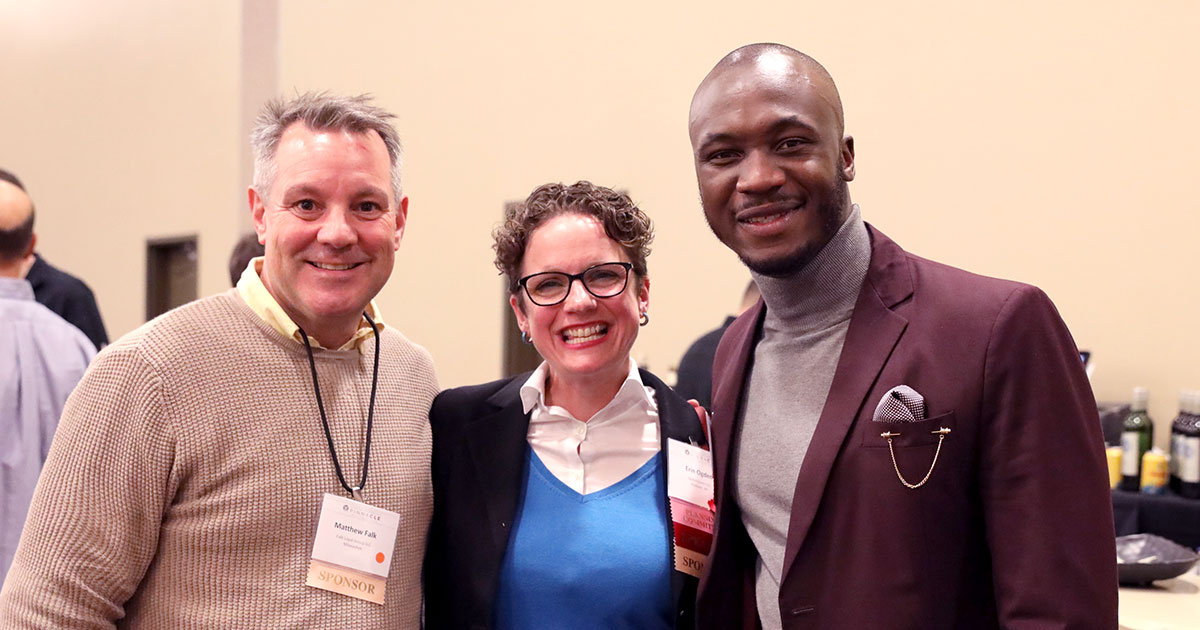
Matthew Falk, Erin Ogden, and Emil Ovbiagele pose during a networking event at the 2022 Wisconsin Solo & Small Firm Conference. For more photos of the event, see the WSSFC album on the
State Bar of Wisconsin Facebook page.
Nov. 2, 2022 – Attorneys from across Wisconsin gathered at Kalahari Resort in Wisconsin Dells on Oct. 27-29 for the State Bar of Wisconsin’s annual
Solo and Small Firm Conference (WSSFC), the first time the conference was held in person since 2019.
Presenters discussed ways solo and small-firm attorneys can improve their practices in a world where technology has made virtual appearances common while imposing new time pressures. Attendees enjoyed several networking receptions and sampled wares and services on offer from dozens of vendors.
Make the Most of Your Time
During a Thursday morning presentation titled “Implementing Flexible Work Schedules and Maximizing Your Time,” JoAnn Gromowski, Erin Ogden, and Emily Stedman discussed ways for attorneys to make the most of their increasingly precious time.
Gromowski, an estate planning solo practitioner, said she avoids scheduling appointments on Fridays. She uses Fridays to catch up on paperwork and housework and doesn’t take phone calls or reply to emails.
Gromowski said her clients accept her schedule because many of them look back on their working lives and wish they had taken more time for themselves.
“You’re not calling your doctor at home, you’re not calling the dentist or the wash machine repairman at all hours of the day,” Gromowski said. “They come to respect you for it because they’ve been through it themselves.”
Ogden, partner at a four-lawyer firm in Madison, advised lawyers to use work-from-home arrangements to add flexibility for employees with special needs.
For instance, allowing a paralegal who uses a wheelchair to work from home could be an option for a solo practitioner whose office is in a building with many steps.
To aid with time management, Stedman encouraged lawyers to experiment with new technologies.
“There are a ton of tools out there,” Stedman said. “From sending emails at a delayed time, setting your voice mail to say ‘I’m out of the office,’ getting creative with what you put in your out-of-office email.”
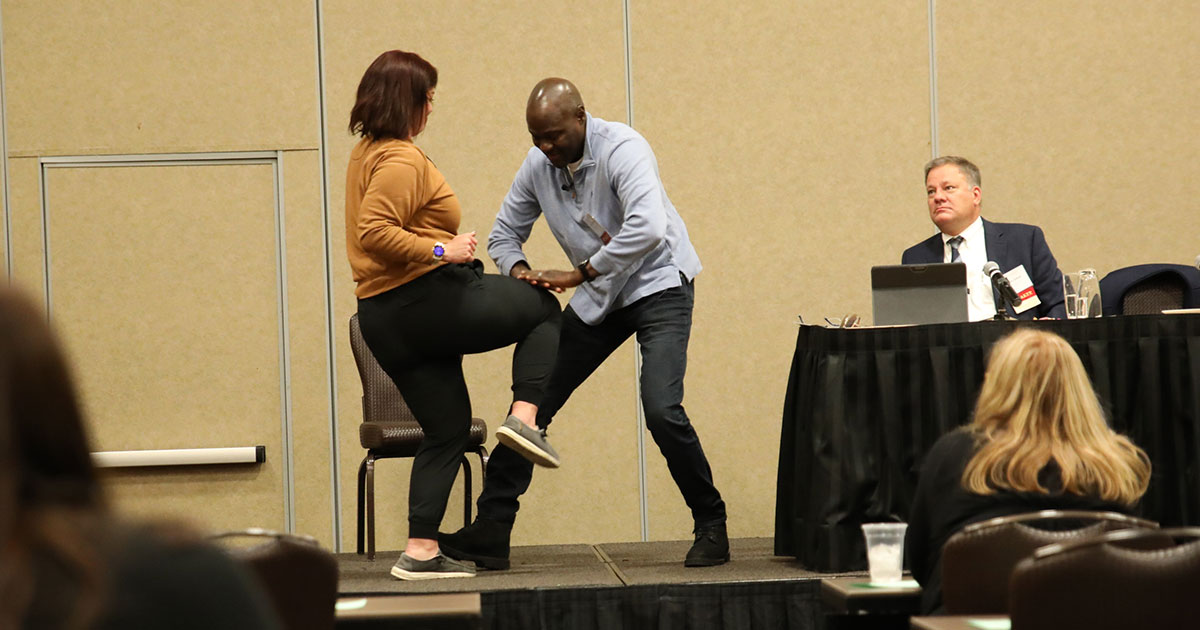
A fight?! Not quite. Lessons on how to de-escalate tense situations with clients and protecting your physical safety, with Jessica Kramer of Kramer, Elkins & Watt LLC and Gregory P. Seibold of Seibold Law Firm LLC, with Mathiam Mbow of Silver Lining Taekwon-Do.
Virtual Replay of Solo and Small Firm Conference Is Nov. 14-16
Want to attend the 2022 Solo and Small Firm Conference virtually? You’ll get access to all CLE sessions and speakers on Nov. 14-16, 2022. This option offers the flexibility of viewing the content from wherever you are.
Attend either dates and earn up to 16.5 overall credit hours from six plenaries and your choice of 32 breakout sessions. Plus, those who attend the live WSSFC can earn more CLE by watching select complimentary webcast replays in December.
For a list of CLE sessions,
check out the schedule at wssfc.org.
View from the Bench
Zoom meetings have been a boon to judges and attorneys during the last two-and-one-half years, especially those in rural parts of the state. But according to two judges who participated in a Thursday morning plenary, “The View from the Bench,” Zoom isn’t suitable for all types of hearings.
Evidentiary hearings and trials are not Zoom appropriate, according to Judge Valerie Bailey-Rihn, a retired Dane County Circuit Court judge.
“To me, it’s not justice if somebody’s sitting in his living room having a judge sitting in her living room telling him ‘We’re going to take away your children,’” Bailey-Rihn said.
“Plus you don’t know who they’re talking to or who’s in that room with them, all of which you control if you’re in person.”
Bailey-Rihn also said that some hearings other than trials and evidentiary hearings, like preliminary criminal hearings, aren’t appropriate for Zoom.
“We had people showing up in the bathtub,” Bailey-Rihn said. “I had one person who was totally naked. We had one person lying in bed with his girlfriend.”
Judge Randy Koschnick, the Director of State Courts, told attendees that he thinks the backlog of criminal cases around the state has peaked. He said a labor shortage bears a big share of the blame for the backlog.
In addition to shortages in the number of public defenders and assistant district attorneys, Koschnick said, “We’ve got a shortage of court reporters, and sometimes we have a hard time hiring clerks and deputy sheriffs as bailiffs.”
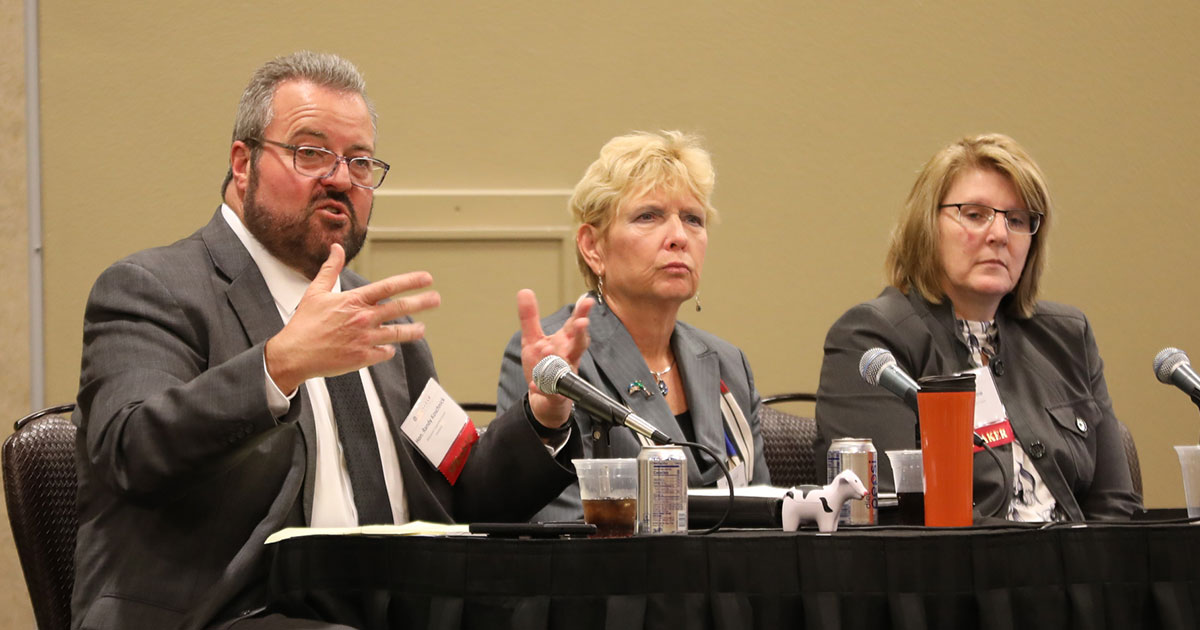
Director of State Courts Judge Randy Koschnick makes a point during a “The View from the Bench,” a plenary session on Thursday, Oct. 27. Next to Koschnick are, from left, Judge Valerie Bailey-Rihn and Judge Kristine Snow.
Keep Hackers at Bay
Aaron Brooks, a lawyer and cybersecurity expert, educated attendees on best practices for cybersecurity during a Thursday afternoon breakout session.
Brooks said lawyers should put together long and random words when creating usernames and passwords and be sure to use a different password for each account.
Additionally, Brooks recommended building “four layers of complexity” into passwords by including one of the following in every one:
a number;
an uppercase letter;
a lowercase letter; and
a symbol.
When it comes to cybersecurity, Brooks said, vigilance is the word.
“All a hacker has to do is find one weakness,” Brooks said. “You need to find them all.”
Phishing emails – where a hacker sends an email or text message that looks legitimate – pose particular dangers. The goal of a phishing email is to get you to give up your username and password.
Brooks said that fending off phishing emails is like going through a police tactical training course, where participants are confronted with a series of cardboard pop-ups and must decide in a split second which ones to shoot (those depicting bad guys) and which not to shoot (those depicting hostages or bystanders).
“Never reset an account from an email,’ Brooks said “You’re going to get an email that says ‘Tech support – your password expires in three minutes, click here to reset password.’ Never click on an email to reset your password.”
Brooks also recommended that attendees check for computer updates on regular basis, at least weekly.
“If [laptops] are running the latest version of the software but they don’t have all the security patches that the vendors have pushed out, that’s a vulnerability, and it’s a super easy one to fix,” Brooks said.
Running a Lean Law Firm
During the Friday morning plenary session, Dave Maxfield and Larry Port, authors of a book on law firm management, told attendees that a law practice is not different than any other type of business.
“In the big picture, all businesses work the same way,” Maxfield said. “They take some kind of raw material and put it through some kind of process,” Maxfield said. “Our raw material is human beings with problems.”
According to Port, the way to make your law practice more profitable is not by adding clients or working longer or harder; the way to do it is to become more efficient at handling the clients and cases you already have.
Port cited reducing the number of accounts receivable as an example.
“It’s what you do after you get that case that matters most,” Maxfield said.
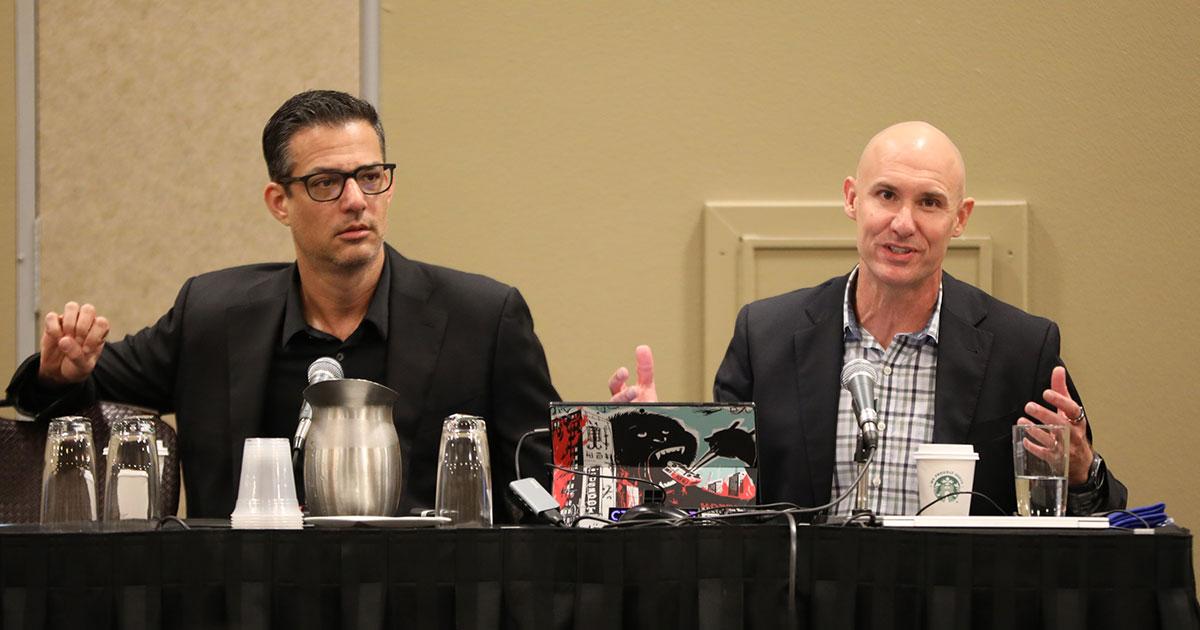
Larry Port (left) and Dave Maxfield (right) presented on how to run a lean law firm.
Considerations in Attorney Compensation
Dollars and cents was the main topic of a breakout session on Friday morning titled “Considerations in Attorney Compensation.”
Emil Ovbiagele, founder of a three-lawyer firm in Milwaukee and a former big-firm lawyer, told attendees that there are considerations other than money when creating an attorney compensation model.
“Money only goes so far in terms of motivating folks, especially in the climate we’re in today,” Ovbiagele said. “It starts with the culture and the types of behaviors you’re trying to incentivize.”
Ovbiagele said his experience with the billable hour has convinced him there’s got to be a better way for firms to compensate attorneys.
“We all know how to legally bill an hour in 10 minutes,” Ovbiagele said. “I think that’s crazy, and the legal industry needs to move away from it.”
Julie Bogle, a lawyer and CPA who left the practice of law to advise law firms on compensation models, said transparency is key.
As an example, Bogle pointed to her own experience working as an associate at a mid-sized Madison firm.
“I was one of the few associates who understood the compensation structure because I was working on partners’ tax returns, so I got to see how the sausage was made,” Bogle said.
“The other associates were not educated as to what the compensation structure would be if they accepted a partner position. There’s something deeply wrong with that.”
Ovbiagele seconded Bogle’s sentiments regarding transparency.
“I hope this a catalyst for sharing information, because the legal industry is really opaque when it comes to sharing information about this stuff,” Ovbiagele said.
He also said that firms should do a better job of distinguishing between “finders, minders, and grinders” – a catchphrase that separates rainmakers from those who prefer to update files and perform legal work.
“We’re trying to incentivize minders more than just finders,” Ovbiagele said. “Not everyone’s built to go out and get business.”
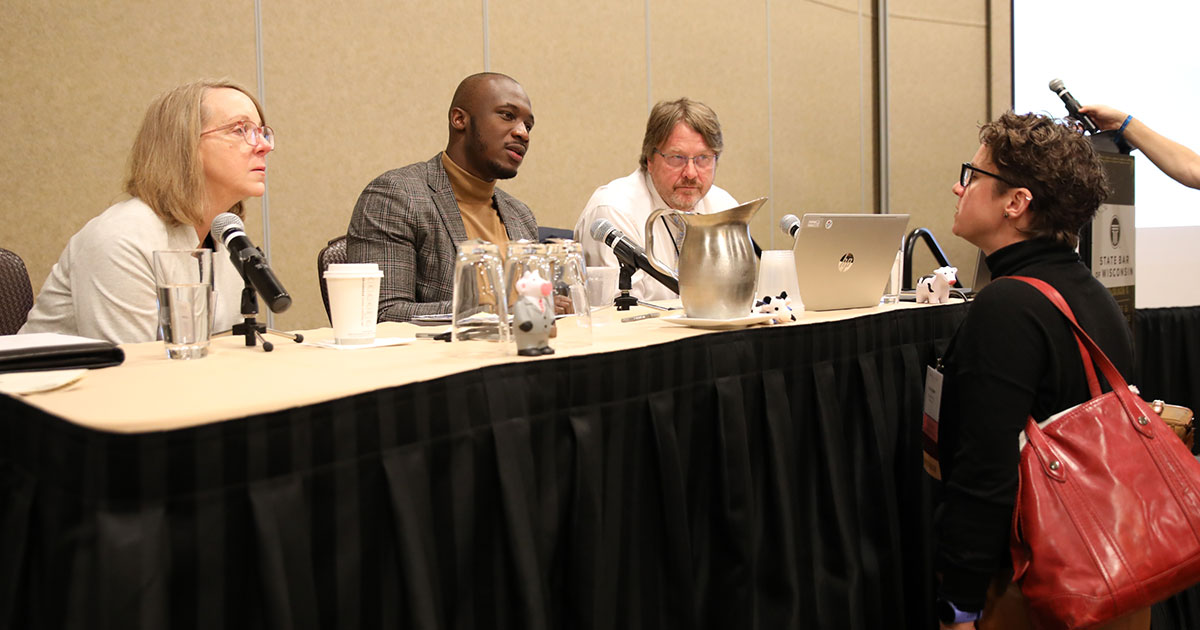
From left: Presenters Julie Bogle, Emil Ovbiagele, and Christopher Dodge listen to a question from Erin Ogden at the conclusion of a panel on attorney compensation.
12 Tips from the Wisconsin Solo and Small Firm Conference
Here are 12 tips from Sarah Haas, J. David Krekeler, and Stephanie Melnick, who presented “More than 50 Tips” at the 2022 Wisconsin Solo and Small Firm Conference.
Use a digital notepad instead of paper legal pads.
Use Outlook to create a daily task list and set client matter dates.
Keep Fridays clear of appointments and use the time to catch up, prepare for the next week, or work on your business plan.
Affirm people’s gender pronouns and nicknames.
Use Word macros at the bottom of all correspondence to either thank clients for being current on fees or remind them of payment terms.
Publish an email newsletter, to maintain meaningful contact with clients.
Remember to clear tracked changes before sending documents to clients and opposing counsel.
Create template documents, to standardize heading for letters, pleadings, motions, and briefs.
Integrate quiet hours into your schedule.
At intake, gather client information that will enable you to send thank-you notes or gifts.
If it fits your practice, rotate billing – for instance, instead of billing at the end of each month for all clients, use the date the client signed the engagement agreement as the billing cycle’s trigger date.
Have each client sign an initial meeting agreement, so there’s no confusion about the scope of the representation.
